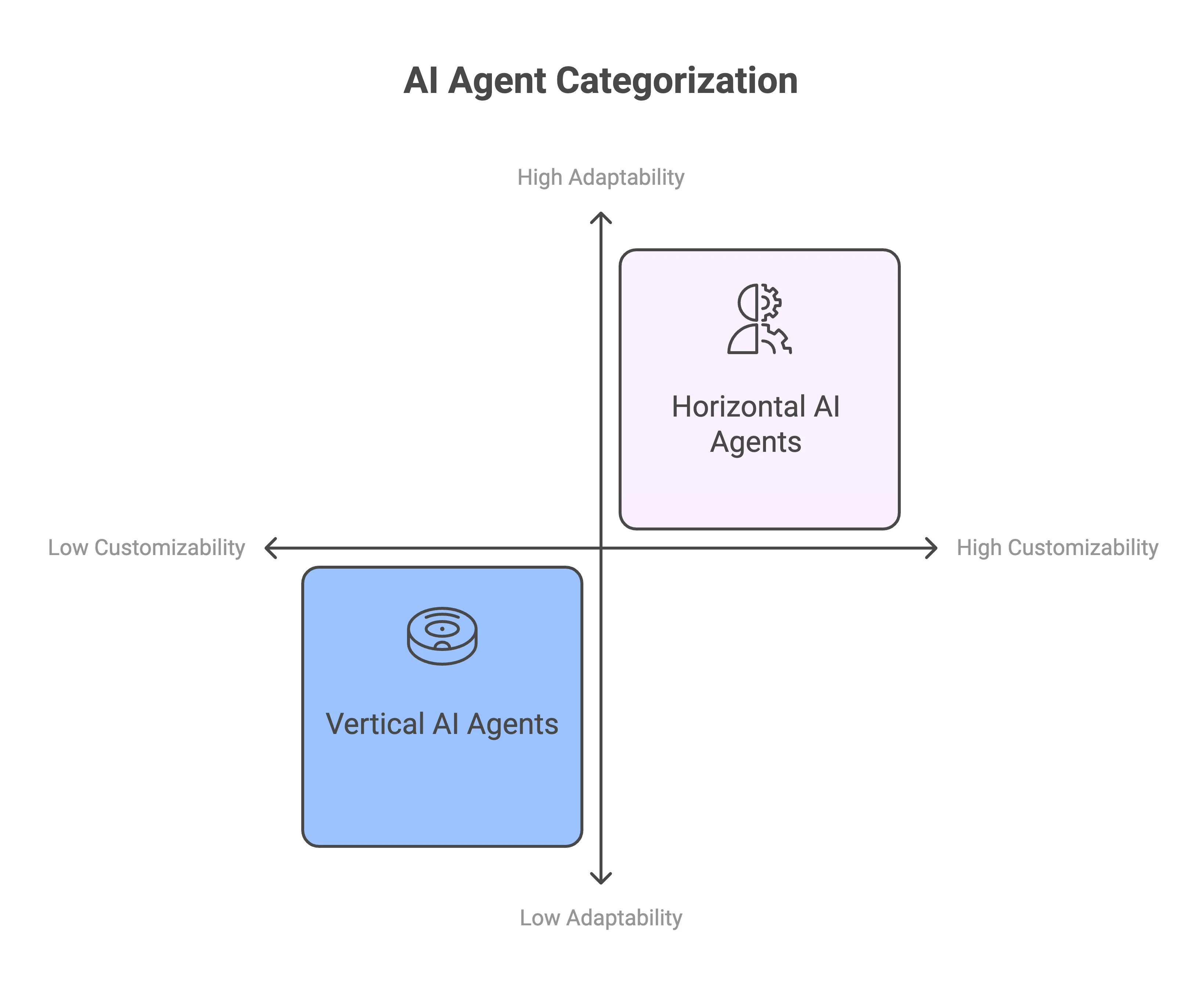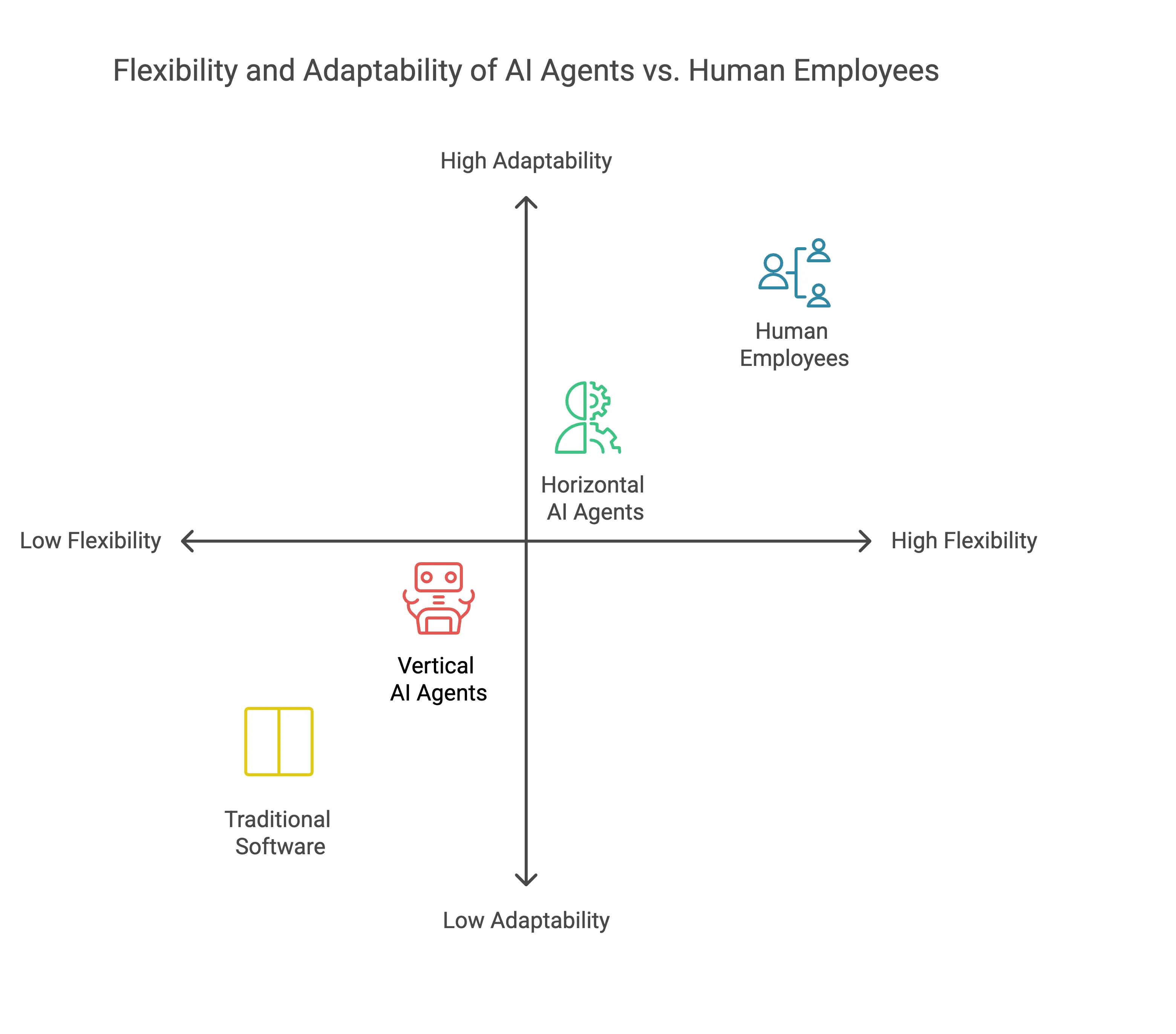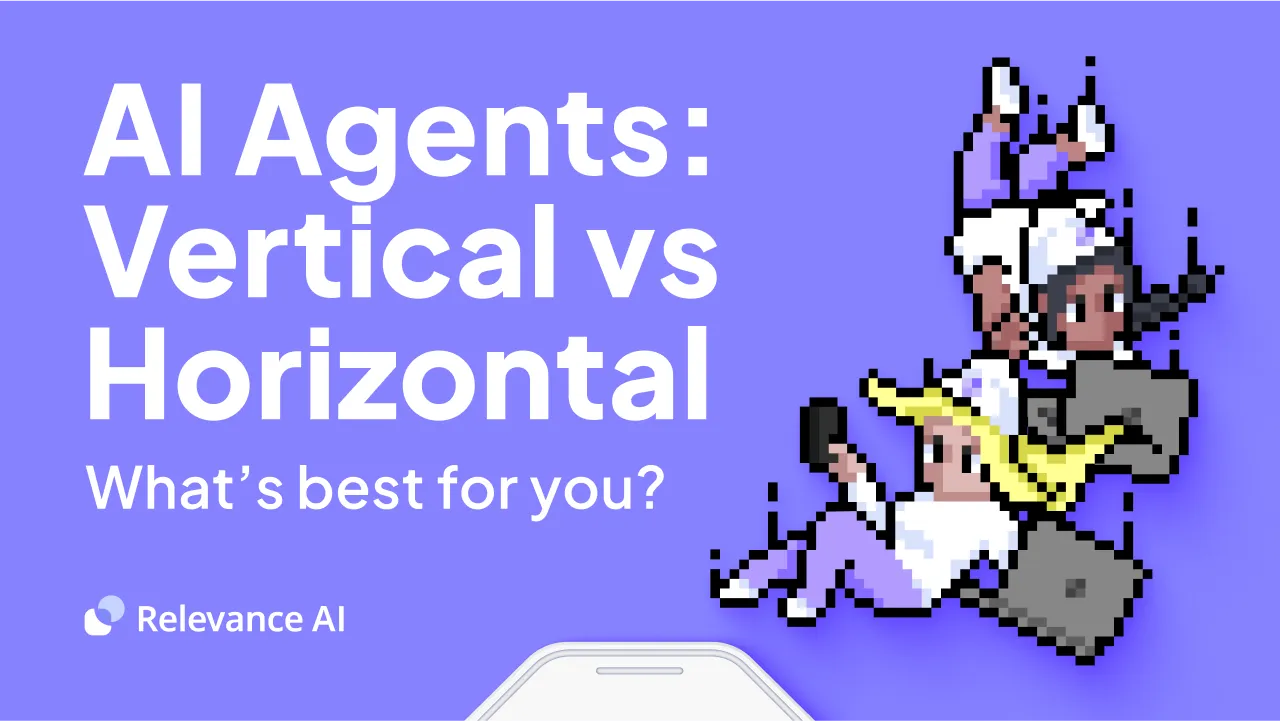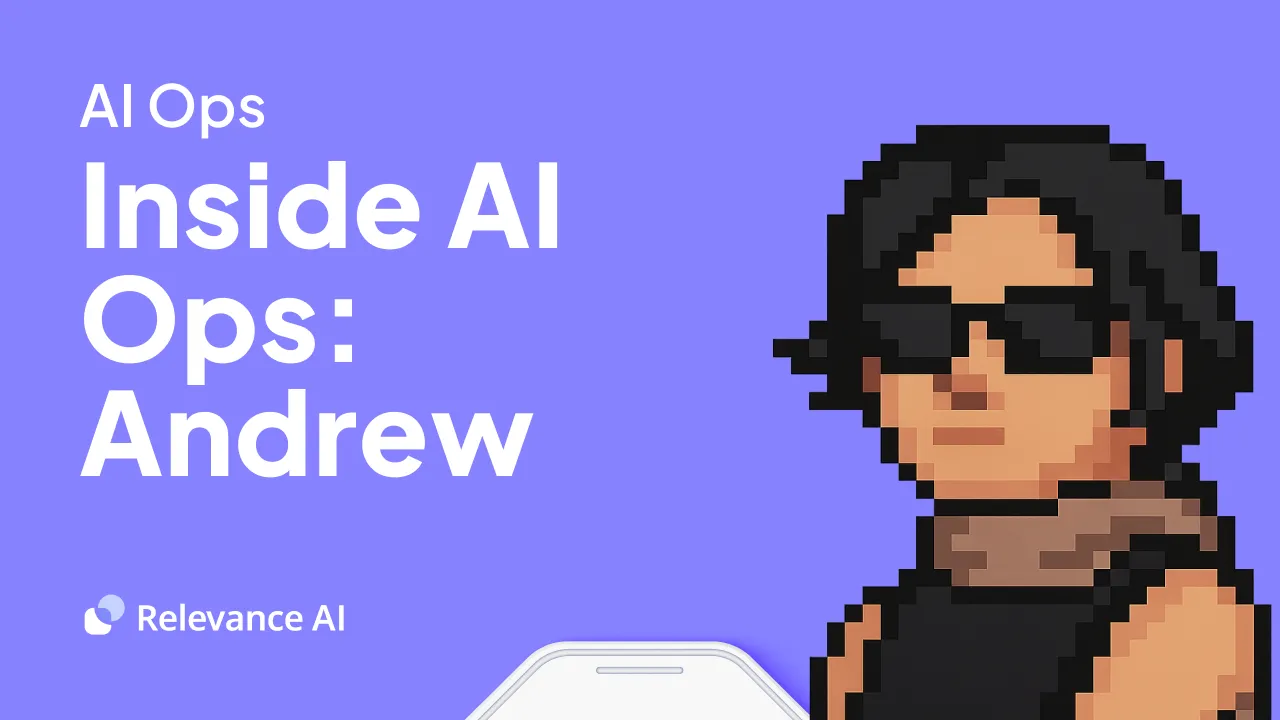
AI agents are revolutionizing how businesses operate, offering efficiency gains and competitive advantages through automation and enhanced customer service.
However, not all AI agents are created equal. Companies are faced with a decision: Should they onboard AI agents on a flexible, adaptable platform (known as a horizontal platform), or opt for specialized, task-specific agents (vertical solution agents). This choice shapes how effectively businesses can adapt to unique workflows and market demands. Like employees, AI agents that can learn and evolve with your business is essential. An agent that fits perfectly today might become obsolete tomorrow if it can't adapt.
Moreover, horizontal AI agents not only offer adaptability but also perform single-use cases better than vertical agents, because they can be precisely tailored to your specific needs
In this article we’ll explore the key differences between horizontal and vertical AI agents, highlight how horizontal agents can outperform vertical solutions even in specialized tasks, why adaptability matters and how the right choice can impact your business's success in the long run.
Understanding AI Agents: Horizontal vs. Vertical
What Are Vertical AI Agents?
Vertical AI agents are specialized software designed to perform specific tasks within a particular department or function, such as sales, marketing and customer support. Think of them as single-purpose assistants that excel at one thing but aren't flexible beyond their defined role.
For example, imagine an AI agent that handles customer support requests. It can answer frequently asked questions and provide basic support, but if you suddenly need it to assist with issuing refunds, it's not equipped to help.
Advantages of Vertical AI Agents
- Quick Implementation: Pre-built for specific tasks, vertical agents can be deployed rapidly with minimal setup time
- Specialized Expertise: They excel at their designated functions, offering deep capabilities within their narrow focus
- Pre-Configured Features: Ready to use immediately with predefined features and capabilities that match common industry needs
- Cost-Effective Short-Term: Often cheaper initially compared to developing custom solutions for specific use cases
Limitations of Vertical AI Agents:
- Limited Configurability: These agents can't easily adjust to new tasks or processes. Customizing them to meet evolving needs is challenging
- Provider Dependence: If you want to modify or expand what the agent can do, you'll likely need to contact the original developer or provider and pay extra for changes
- Integration Challenges: Since they're designed for general use, they may not fit smoothly and align perfectly with your company's unique platforms
By understanding these limitations, it's clear that while vertical AI agents can be helpful for specific tasks, they may not offer the flexibility needed to keep up with changing business demands.
What Are Agents Built on Horizontal AI Platforms?

Agents built on horizontal AI platforms are like adaptable team members who can learn to use new tools and processes within your organization. These AI agents are tailored to your specific business needs.
Advantages of Horizontal AI Agents:
- Customizability: You can tailor them to fit your unique processes and workflows, ensuring they align perfectly with your operations
- High Adaptability: They can be trained to perform a wide range of tasks, adjusting as your business evolves
- Scalability: As your business grows, these agents can scale with you without needing to be replaced
Disadvantages of Horizontal AI Agents:
- Longer Initial Configuration: Setting up a fully customizable agent can take more time at the start, compared to a plug-and-play vertical solution.
- Higher Upfront Involvement: You or your team need to invest in training and learning to configure these agents effectively.
- Excessive for Simple Tasks: If you only need a simple, single-function agent, a fully flexible system may exceed your requirements and budget
Just like retraining an employee to take on new responsibilities, horizontal AI agents can be reconfigured or trained for new tasks quickly. This flexibility ensures that your AI workforce remains relevant and effective as your business needs change.
Where do AI Agents fit on the software vs employees spectrum?

- Traditional Software: Least flexible with rigid functionalities.
- Vertical AI Agents: Slightly more flexible but still limited in adaptability.
- Horizontal AI Agents: Highly adaptable and can be reconfigured or trained for new tasks.
- Human Employees: Most flexible, capable of extensive training and adaptation.
Horizontal AI agents closely resemble human employees in terms of adaptability. They can quickly adjust to new processes, integrate with different systems, and take on additional workload as your business grows. This flexibility is crucial for meeting unique challenges and staying competitive in a rapidly changing market.
By choosing horizontal AI agents, you're investing in solutions that can evolve with your business—much like investing in the professional development of your staff.
Introducing Our AI Agents: Bosh, Apla, and Lima
Meet our AI agents built on the adaptable horizontal AI Agent builder platform and designed to evolve with your business needs, just like a valuable team member.
Bosh – The AI SDR Agent:
- Automates sales development tasks like lead qualification and outreach.
- Adapts to your specific sales processes and tools for seamless integration.
Apla – The Account Planner Agent:
- Streamlines prospect research and account planning saving sales team valuable time
- Learns from your value proposition to deliver personalized insights tailored to your goals.
Lima – The Lifecycle Marketing Agent:
- Personalizes marketing outreach across every stage of the customer journey.
- Configurable to match your unique marketing workflows and campaigns
Because they're built on our horizontal platform, all these agents offer the adaptability just like an employee who can learn and grow. These AI agents can be trained or adjusted to fit your specific needs, ensuring they continue to add value as your business evolves.
Making the Right Choice for Your Business
Adaptability is essential in today's business environment. Horizontal AI agents offer the flexibility and scalability that vertical solutions lack. By choosing agents that learn and evolve like your employees, you're investing in technology that grows with you.
Key benefits of horizontal AI Agents:
- Adapt to new tasks and processes as your needs change.
- Integrate seamlessly with your unique workflows and systems.
- Scale with your business without costly replacements.
This flexibility saves you time and resources, allowing you to focus on driving your business forward. Investing in adaptable AI agents equips your team with tools ready for today's tasks and tomorrow's innovations.
Ready to empower your business with adaptable AI agents?
Schedule a demo with us today to learn more
Let us show you how our AI agents can become invaluable team members, boosting efficiency and supporting your success

















